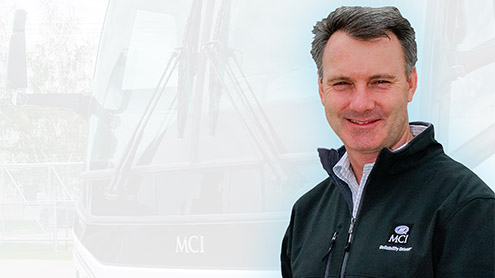
Patrick Scully speaks to new MCI initiatives
By David Hubbard
As Motor Coach Industries (MCI), Schaumburg, IL, builds on its Reliability Driven strategy, Patrick Scully, executive vice president, Sales and Marketing, spoke with BUSRide on recent company initiatives to strengthen customer service and support.
Talk about the specific steps MCI is taking to meet its initiatives.
We started by assessing the best possible approaches we would need to take to better serve our MCI customers and meet their needs. Most notable to them would be how we’ve reorganized our sales force in such a way that our field sales staff represent all products offered through MCI. Before we had a very specific sales force for each product — MCI coaches and the Setra brand, as well as for each sector, private and public.
How do the sales representatives function under the new structure?
Every MCI sales representative has the capability to sell any and all of our products. We do not want our customers to have such a splintered view of MCI now that we provide Setra coaches. We also have reduced the size of our sales territories to allow our sales teams to best serve their customer base.
With this scenario, each field sales representative can become a more reliable and trusted source for customers who operate all MCI products, from the J-models to Setra to the D-Model coach. Additionally, we have invested significantly in our parts inventory to ensure better products and further support for our customers after the sale.
How is MCI positioning the Setra brand in the product mix?
I enjoy an 11-year history with Setra and am excited to continue with the brand under MCI. Setra has always stood for customized luxury and serving a more premium sector position in the business segment. From a customer perspective, Setra coaches offer a greater number of customizable options that come with full support from the network of MCI service and parts facilities throughout the U.S. and Canada.
What is happening in the MCI Public Sector Division?
The public sector has always been very important to MCI. With low-cost of operation leading the entire industry, MCI is the leader in commuter buses in the public sector market. We run the gamut from serving the very large to the very small public transit agencies, so the D-model fits in very well where the commuter base travels into the city.
We also serve a great number of suburban transit agencies operating in the smaller communities around the larger cities. LA Metro does not run coaches, for example, but LA DOT does.
In Chicago, PACE conducted a pilot program running MCI commuter coaches on the shoulder during rush hour to prove that it can grow its customer base. From the success of the testing, we will deliver 13 new D-models to the agency this fall.
What’s the state of the public’s view of the bus and coach industries?
I think our reliability and professionalism on the supply side to provide better, safer vehicles goes hand in hand with the operators in both the public and private sectors who are performing at a much higher level. I believe the public sees all this in a positive way, judging by the demand from those who see buses and coaches as a better way to travel.
There have been tremendous improvements to motorcoaches over the last 10 years, including reduced emissions, improved safety, upgraded onboard amenities and passenger comfort. They’ve all contributed to a more positive perception of motorcoaches.
